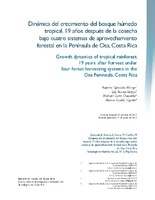Dinámica del crecimiento del bosque húmedo tropical, 19 años después de la cosecha bajo cuatro sistemas de aprovechamiento forestal en la Península de Osa, Costa Rica.
Date
2012Author
Quesada-Monge, Ruperto
Acosta-Vargas, Luis Guillermo
Garro-Chavarría, Michael
Castillo-Ugalde, Marvin
Metadata
Show full item recordAbstract
Within the project “Monitoring of forest ecosystems
to strengthen conservation strategies and forest use: a
contribution to Costa Rica carbon neutral initiative”, the
dynamic growth of the tropical rainforest was studied,
nineteen years after harvest under four systems of forest
use. Through the measurement of all trees (d ≥ 10 cm),
three revenue sites were botanically identified in the
Peninsula de Osa (Estero Guerra, Dos Brazos de Río
Rincón and Los Mogos). Four permanent sampling parcels
(PPM) of 1 HA were installed in 1990.
At that time and subsequently, fifteen and nineteen years
later (2007 and 2011, respectively), the status of the
primary forest was examined after applying four logging
systems: oxen harvesting system (SACB), improved
harvesting system (SATM), traditional harvesting system
(SATT) and oxen-tractor system (SABT).
The analysis of the forest dynamic was made based on
growth, mortality, recruitment and replacement rate.
The current annual increment (ICA) average for the
period under review ranged from 2,47 to 3,56 mm /
year. Statistical analysis showed that the ICA value has a
normal distribution and homoscedasticity and the analysis
of variance indicated no significant differences between
the ICA of each logging system (p = 0,3410).
The average mortality rate of the four logging systems
is 1,301%, the recruitment rate is 1,869%. The annual
turnover rate is 0,569%. Statistical analysis found that
mortality; recruitment and replacement rates show a
normal distribution and homoscedasticity. On the other
hand, analysis of variance showed that differences between
the different logging systems are not significant (mortality:
P = 0,2412; recruitment: p = 0,0675; parts: p = 0,1159).
Paired t tests showed that the mortality and recruitment
rates are statistically the same within each logging (SACB:
p = 0,4992; SATM: p = 0,9238; SATT: p = 0,9080; SABT:
p = 0,8065), confirming the dynamic equilibrium of the
forests under study.
Description
Artículo
Share
Metrics
Collections
- Artículos [36]


